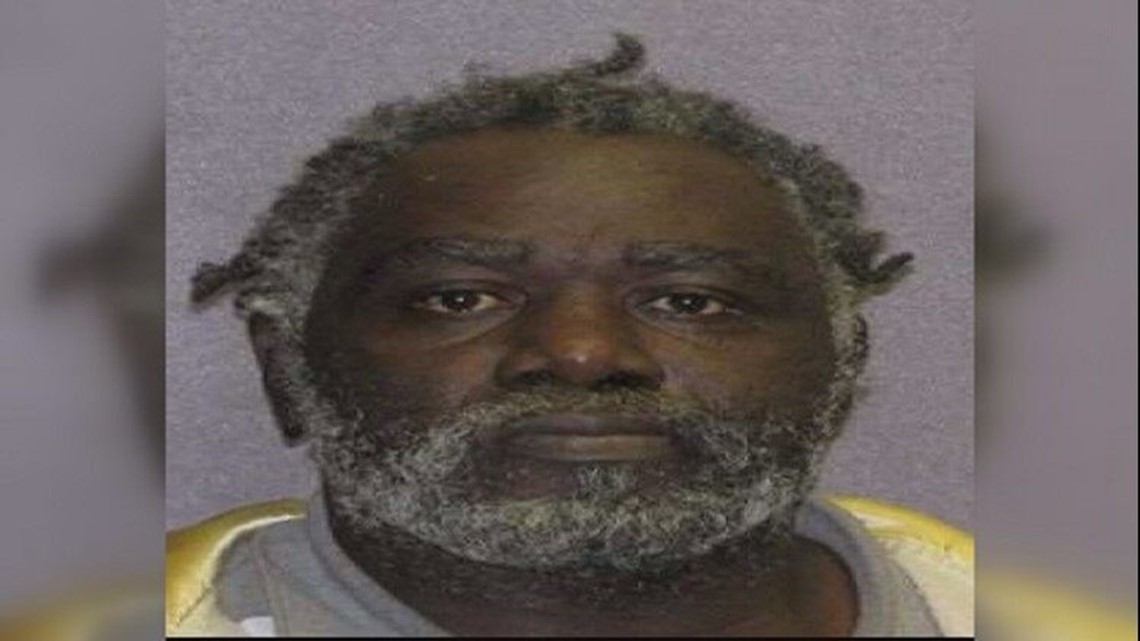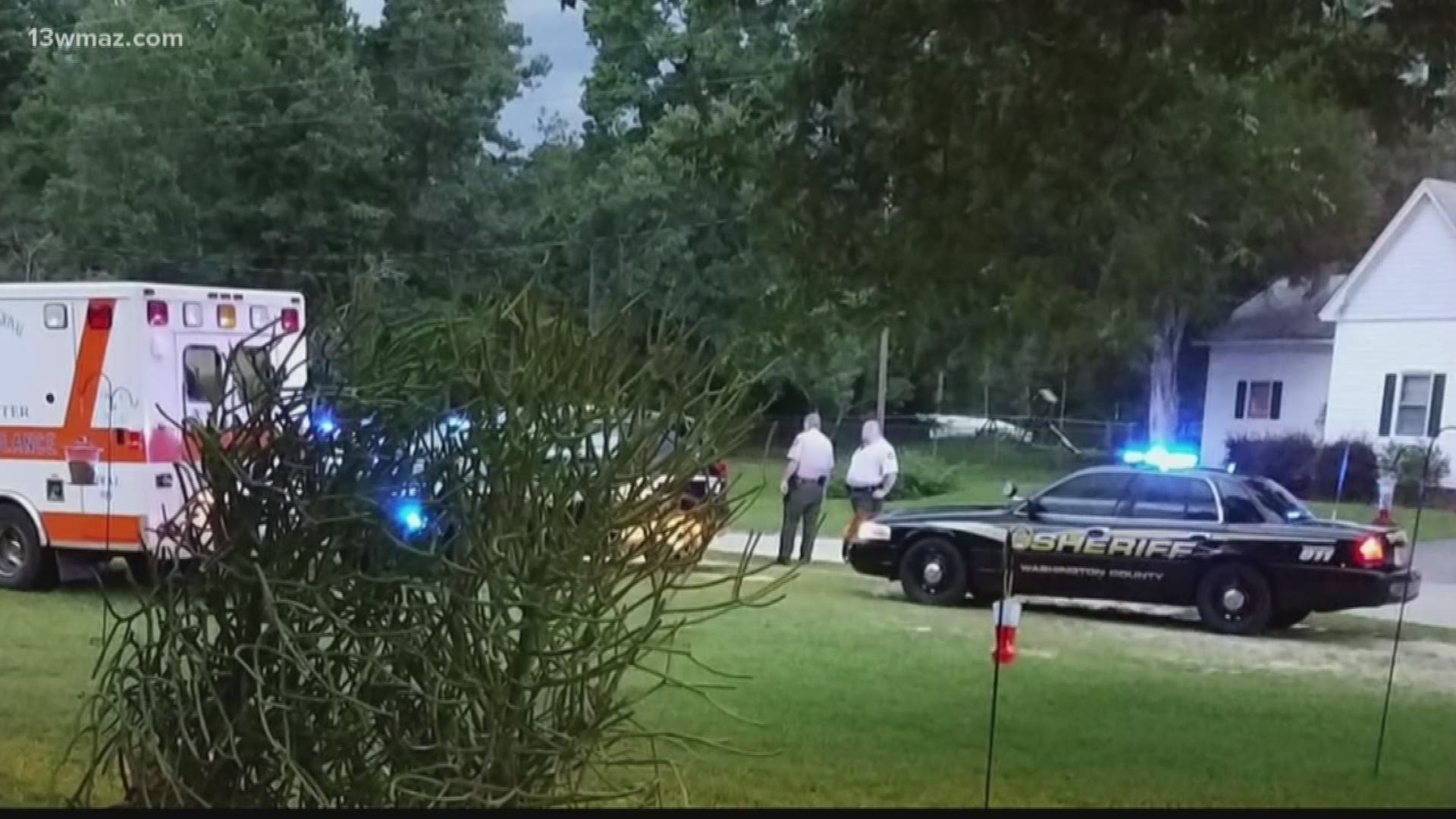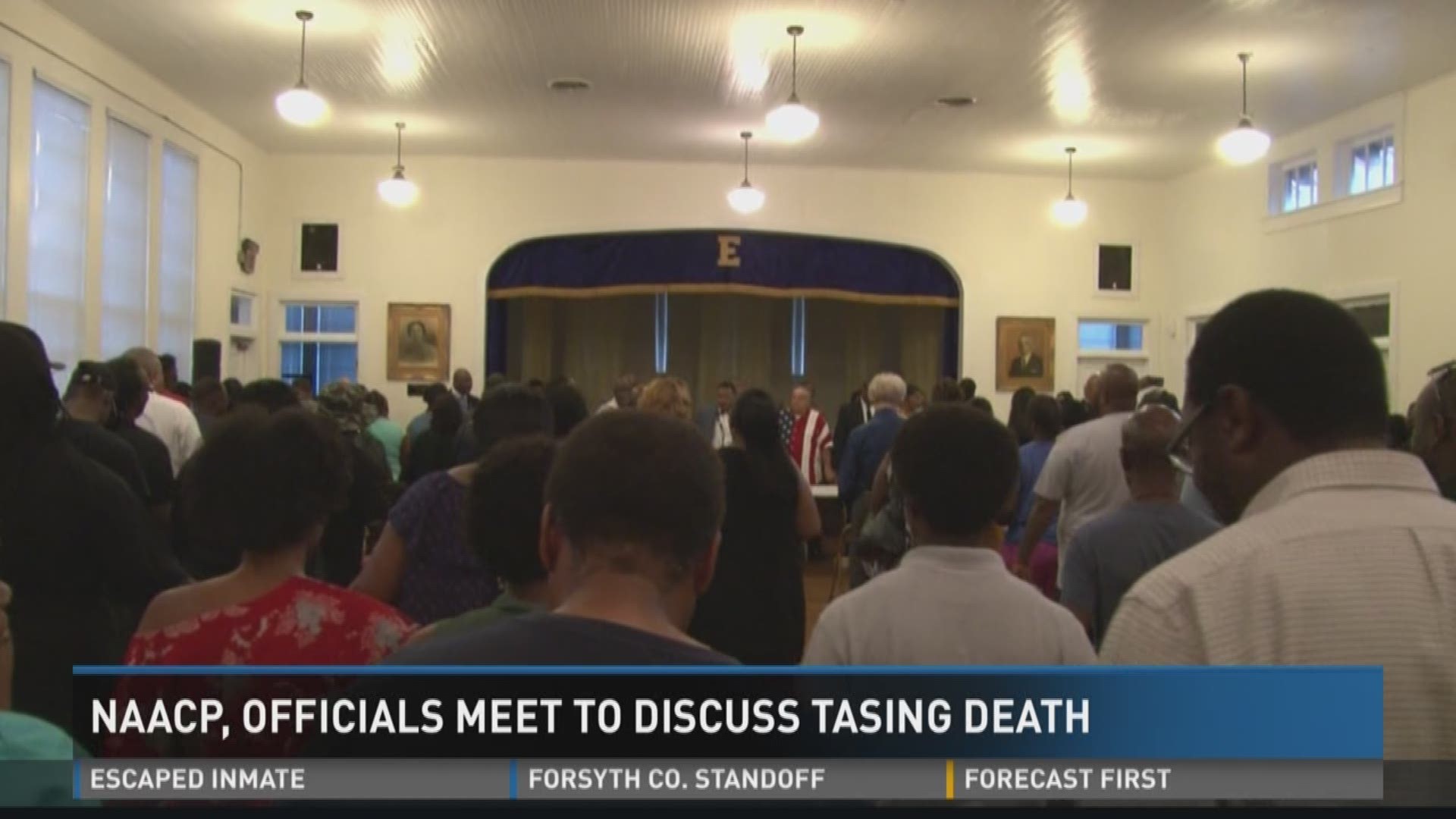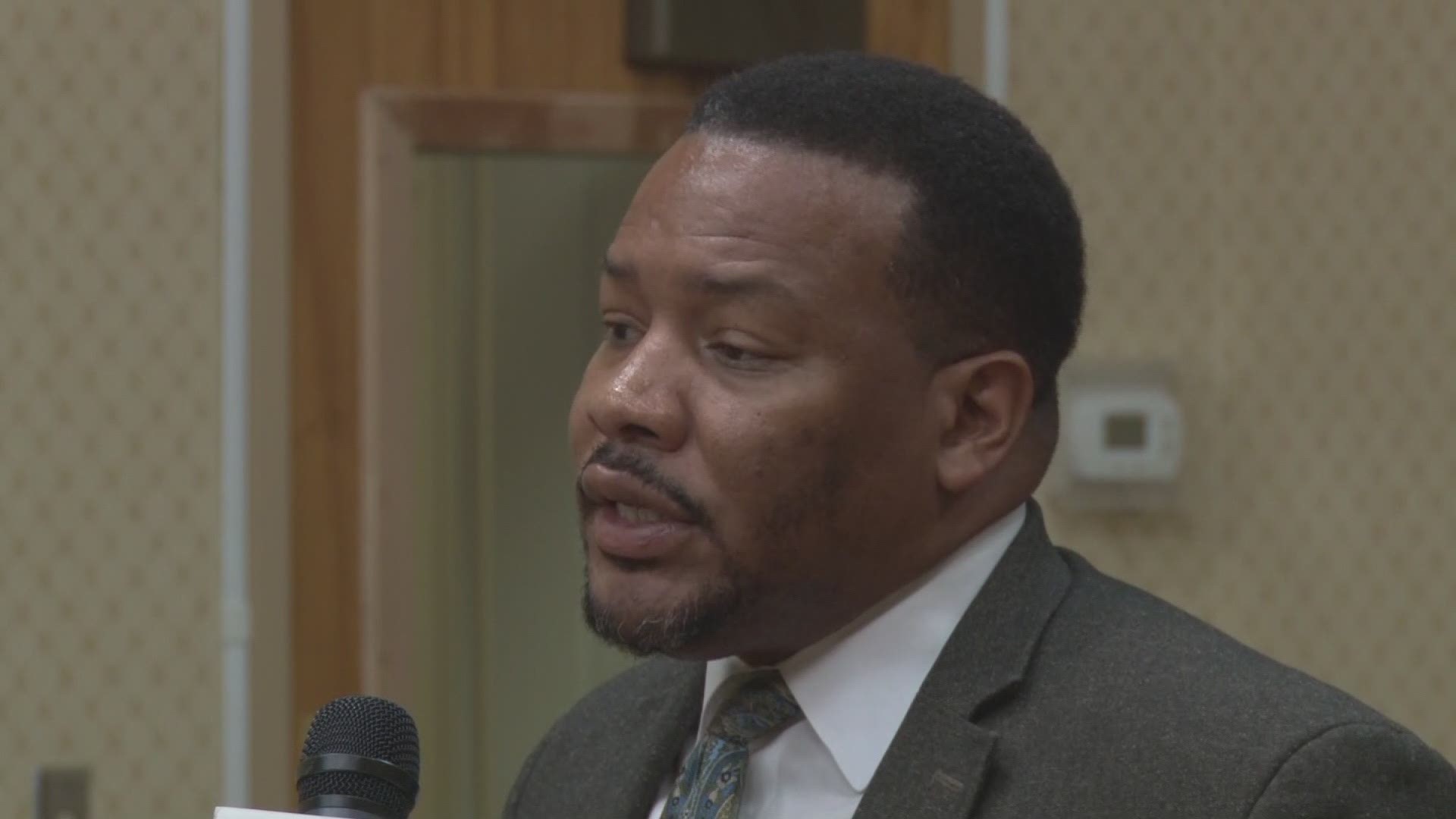'My God, what's goin' on?' | Judge's order breaks down Washington County fatal tasing
The judge last week dropped murder charges against three Washington County deputies, but his order raised new questions about the deadly-force case

It all started with a man trying to fill a Coke can with water on a steamy midsummer day.
It ended with that man dead by the side of Deepstep Road in Washington County.
According to Judge H. Gibb Flanders, a superior court judge, it took about 16 minutes.
Flanders' order, issued last Monday, threw out murder charges against three former Washington County deputies who responded to a "suspicious person" call.
Two of them tased Eurie Martin more than a dozen times on July 7, 2017, and he died within minutes.
The judge's order breaks down what happened, almost minute by minute, and provides new details about how Martin died.
But those details also raise more questions about the case.
The judge writes, for example, that deputies didn't know the department's tasing policy, didn't understand the health risks of tasing and didn't realize that Martin was mentally ill.
Flanders also noted several times that the suspect was not violent or aggressive toward the deputies.
Despite that, the officers used deadly force on a man suspected of minor crimes -- loitering, walking on the highway and obstructing an officer -- a misdemeanor.
District Attorney Heyward Altman says he'll appeal Flanders' Nov. 25 ruling.
That means a higher court may decide whether the tasings were justified or whether Martin was -- as the head of Georgia's NAACP said two years ago -- electrocuted for "walking while black."
'CRAZY, DRUNK, OR WHAT'
Flanders' order describes how it all started.
A Washington County man -- identified in Flanders' order as "Mr. Harris" -- told authorities that the man who walked up his driveway was "filthy," wearing low-riding cutoffs and "a piece of a shirt."
He didn't know the stranger, who was carrying a Coke can and wanted to fill it with water from an outside spigot. The heat index that day was over 100 degrees.
Harris says he pulled his riding mower between the man and his house and told him to get off his property.
Martin did leave, Flanders wrote, "without any confrontation."
But as he walked away, Mr. Harris decided to call Washington County 911.
"I got a guy walking up and down the road here just walking in my yard," Harris said, "and I don't know whether he's crazy, drunk or what, but he's walking from back towards Deepstep... Think you need to check him out."
The judge notes that Harris never told 911 why the man came onto his property -- to get a drink of water.
'WHO ARE YOU?'
Flanders' order doesn't explain what Martin was doing on Deepstep Road that afternoon.
His family later told investigators that he had a long history of mental illness and treatment.
And the first deputy on the scene, Michael Howell, also commented on Martin's appearance.
"He was very dirty. It looked like he hadn't bathed in a while. He was sweating profusely. I mean, he was covered in sweat real bad. His hair looked like it hadn't been washed in days. I mean it was just nasty. He had an evil look in his eye like he didn’t want to talk to me or whatever."
Sheriff's department policy says deputies should follow up on suspicious-person calls by finding the person, getting their name and running a record check, so that's what Howell tried to do.
He testified, "I left the window down and asked him if he was OK and what his name was, and he said, 'Who are you?' in a loud tone.... And my gut told me something was wrong and not to get out of the car."
Howell called for backup and the other two Washington County deputies on duty headed toward Deepstep Road: Henry Lee Copeland and Rhett Scott.
While he waited, Howell drove slowly behind Martin as he walked down the road toward Sandersville
'TASE HIS ASS'
Copeland arrived first, from the opposite direction, and parked his cruiser by the side of the road with the blue lights flashing.
Then he and Howell approached Martin from each side.
The judge wrote that Martin was "talking in a loud voice, motioning with his arms, opening and closing his hands" and trying to walk down the middle of the road away from the officers.
Then, according to the judge, "Mr. Martin throws down the Coke can, takes a defensive stance and clinches his fists."
Copeland ordered him to stop and put his hands behind his back, but Martin didn't.
When Howell asked if Copeland has a taser, the other officer said he did.
Howell said, "Tase his ass."
Copeland warned Martin one more time, then tased him.
The judge wrote, "Mr. Martin is at the roadside, he shouts, "My God, what's going on?", falls to the ground and he pulls a taser prong from his arm.""
And that alarmed Howell even further.
He testified, "When I knell down and he ripped that barb out, I was like, 'This is not for me.' Because if a grown man can take that and rip it out of his arm, I ain't fixing to fight with him."
'THEY COULD PROBABLY USE SOME BACKUP'
Martin pulled out the taser barb, stood up, and began walking away.
That's when Howell messaged the third deputy, Scott, to "step up."
"We tased him," Howell told Scott, "but he's still fighting."
When Copeland approached him again, Martin swung at the deputy, missed and began walking away again.
Scott arrived on Deepstep Road to see Copeland and Howell facing Martin, who was standing with his hands on his hips. Flanders called it "a standoff."
"There is no overt physical aggression occurring," the judge wrote, "although Mr. Martin is clearly agitated and tense."
The three officers surrounded him, and Flanders notes again, "He is not physically aggressive."
But after he ignored their orders to get on the ground, two deputies tased Martin again -- first Scott, in Martin's lower back, then Copeland.
Martin fell to the ground, but continued to struggle and that's when another witness called 911: "Yeah, uh yeah, you got three looks like three sheriff's deputies have got a guy on the ground across the street from where we're at and they're having problems keeping him there so, they could probably use some backup."
The problem was, Flanders wrote, was that deputies managed to cuff one of Martin's hands, but not the other. That single cuffed right hand, the judge wrote, was a potentially lethal weapon.
So, deputies used a baton to pry Martin's left arm from underneath him. Eventually, the three freed that arm and cuffed it.
By then, according to the judge, Copeland and Scott had tased Martin 15 times in all, for a total of nearly two minutes
The arrest took 16 minutes, Flanders wrote, from Harris's call until deputies put the cuffs on.
But deputies realized he had no pulse and stopped breathing. After EMS arrived, Martin was pronounced dead at the scene.


'TENSE, UNCERTAIN AND RAPIDLY EVOLVING'
Lawyers for Howell, Copeland and Scott argued that, as law officers defending themselves against Martin, they were immune from prosecution.
Before ruling on their immunity motion, Flanders held two days of hearings, on Oct. 16 and 31, to hear witnesses and review the evidence.
Under state law, the judge wrote, people can't be prosecuted when they use force to protect themselves against "death or great bodily injury" or to prevent a violent felony.
Flanders ruled that the officers acted in self-defense, even though Martin was not armed and the judge noted several times that he was not aggressive toward them.
The judge wrote, however, that Martin's "high degree of sustained physical resistance and the inability to quickly bring him under control" justified the tasing. He also wrote that the officers believed that force was necessary to restrain Martin.
He cited a previous ruling that said, "Reasonable force must be judged from the perspective of a reasonable officer on the scene, rather than the 20/20 vision of hindsight....Police officers are often forced to make split-second judgments in circumstances that are tense, uncertain and rapidly evolving..."
'I'M TASED, YOU KNOW, I CAN'T BREATHE'
All three deputies testified about the tasing along with several expert witnesses.
One defense witness was Darrell Ross, a Valdosta State professor and head of its criminal-justice department.
Ross testified that he'd reviewed the videos and other records in the case and concluded that "the deputies responded with appropriate force." According to Flanders' order, Ross has consulted on around 700 use-of-force cases but had never found one in which he felt a taser was improperly used.
Prosecutors called GBI agent John Durden, former head of the GBI's training unit.
He testified that in March 2017, he taught a four-hour course on the use of deadly force and other topics to Washington County officers -- including the three deputies.
GBI policy, Flanders writes, says officers should use chemical weapons, like pepper spray, or impact weapons, like batons, before Tasers or other deadly force.
Durden said he teaches officers to avoid force if possible, by talking things down, changing the tone, trying to figure out what's going on.
He said that's especially important when dealing with people with mental disabilities. Despite Martin's behavior and Harris' call that he may be "crazy," Flanders wrote that the deputies "had no knowledge" of Martin's mental illness.


At least two of the deputies were unclear on their department's tasing policy.
Howell testified he had not seen or read the policy and Scott testified he had never seen a policy manual.
Flanders also wrote that the deputies didn't know that repeated tasings were potentially deadly for large men like Martin -- who was around 6-foot-3, 220 pounds.
Durden said he's started talking about those risks in his training courses since reviewing the Washington County case.
"If you handcuff me and put me in a car and I'm tased, you know, I can't breathe," he said. "You're cutting the oxygen off. I put that in the program now."
STAY ALERT | Download our FREE app now to receive breaking news and weather alerts. You can find the app on the Apple Store and Google Play.
STAY UPDATED | Click here to subscribe to our Midday Minute newsletter and receive the latest headlines and information in your inbox every day.
Have a news tip? Email news@13wmaz.com, or visit our Facebook page.



